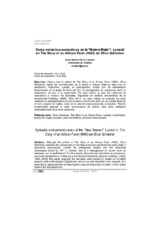Roles sintáctico-semánticos de la “Nueva Mujer”: Lyndall en The Story of an African Farm (1883) de Olive Schreiner
Syntactic and semantic roles of the “New Woman”: Lyndall in The Story of an African Farm (1883) de Olive Schreiner
Autor
Rivas Carmona, M. del Mar
Editor
UCOPressFecha
2019Materia
Schreiner, Olive, 1855-1920The Story of an African Farm
Lyndall
Transitividad
Traducción inglés-español
Roles semánticos
Procesos relacionales
Transitivity
Semantic roles
Relational processes
METS:
Mostrar el registro METSPREMIS:
Mostrar el registro PREMISMetadatos
Mostrar el registro completo del ítemResumen
Pese a que la autora de The Story of an African Farm (1883), Olive Schreiner, siguió las convenciones de la época e incluso firmó su obra con un seudónimo masculino, Lyndall, su protagonista, rompe con los estereotipos tradicionales de la mujer de fines del XIX; es transgresora en cuestiones como el matrimonio, el sexo o la maternidad. Por este motivo, la obra fue calificada de subversiva e, incluso, de blasfema. Siguiendo un análisis funcionalista de la transitividad (Halliday, [1985] 1994, 2014), en este trabajo se analizan los roles semánticos desempeñados por las mujeres a través del discurso de Lyndall tanto en el texto original en inglés, como en la versión propia traducida al español. Resulta fundamental apreciar el valor comunicativo de dichos roles para reflejarlos adecuadamente en el texto traducido. Although the author of The Story of an African Farm (1883), Olive Schreiner, followed the conventions of her time and even published her work under a masculine pseudonym, Lyndall, its protagonist, breaks with the traditional stereotypes faced by 19th c. women; she is a transgressor in issues such as marriage, sex or motherhood. For this reason, the work was described as subversive, and even blasphemous. Following a functionalist transitivity analysis (Halliday, [1985] 1994, 2014), this paper analyzes the semantic roles played by women in Lyndall's speech, both in the original English text, and in our own translation into Spanish. It is essential to appreciate the communicative value of these roles in order to fully reflect them in the translated text.

